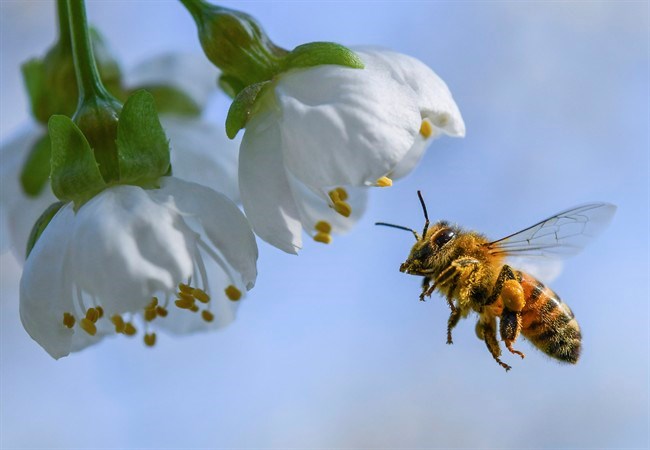 A honeybee flies towards a cherry tree blossom in Markendorf, Germany, Thursday, April 19, 2018. Health Canada still proposes to phase out most outdoor and agricultural uses of a common pesticide even though a recent study found bees are only affected by the substance in certain circumstances. THE CANADIAN PRESS/AP-Patrick Pleul/dpa via AP
A honeybee flies towards a cherry tree blossom in Markendorf, Germany, Thursday, April 19, 2018. Health Canada still proposes to phase out most outdoor and agricultural uses of a common pesticide even though a recent study found bees are only affected by the substance in certain circumstances. THE CANADIAN PRESS/AP-Patrick Pleul/dpa via AP
Health Canada is sticking with its proposal to phase out most outdoor and agricultural uses of a common pesticide, even though a recent study found bees are only affected by the substance in certain circumstances.
The recommendation comes the same day as more than 200 scientists published an open letter asking international governments to develop agreements to not use so-called neonicotinoids, and to prevent similarly harmful pesticides to be developed and used in the future.
In 2012, Canada's Pest Management Regulatory Agency began studying imidacloprid, a common nicotine-based pesticide used by farmers and hobby gardeners, after scientists linked high rates of honeybee deaths to it and other neonicotinoids.
Health Canada concluded honeybees were being affected in some circumstances but not all, and its findings found less harm to bees than was reported earlier this year by the European Food Safety Authority.
However, Health Canada remains convinced it is necessary to phase out most uses of imidacloprid, because a separate study found widespread harm to aquatic species and a build up of the substance in soil and water.
That recommendation stands and will be finalized by the end of the year.
Lisa Gue, an environmental health policy analyst at the David Suzuki Foundation, says Health Canada's results were not as complete as European work, but she remains pleased the agency is still moving to phase out the pesticide's use.


